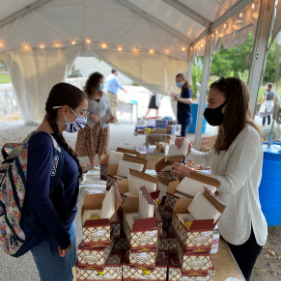Hillels get creative with in-person and online programming

When the COVID-19 pandemic struck, Hillel directors and staff across the United States got creative with online programming. Now nine months into the pandemic and with virtual programming the norm, some Hillels have generated even more innovative events to enhance Jewish life on campus — with and without the warm glow of a computer screen.
For Northeastern University Hillel Director of Jewish Student Life Ariel Walovitch, that meant turning to the beloved TV show, The Bachelorette. Walovitch and Shira Hartman, IACT Director of Immersive Israel Experience, wanted to excite students about Birthright while inspiring them to participate in Jewish learning through a show they know and admire.
Thus, The Bachelorette Fellowship was born. The Bachelorette typically airs in the winter, but because of pandemic constraints, the show aired this fall, composing the perfect layout for the fellowship. Hartman and Walovitch had women apply to the fellowship — similar to the Jewish Learning Fellowship — and would have them watch the show on Tuesday, talk about it on Wednesday via Zoom, and relate it to something Jewish.
“When you’re an unengaged student, a lot of them don’t want to jump right into JLF and do Jewish learning just because they want to learn about Torah,” Walovitch says. “They want to talk about what they want to talk about, and it’s our job to take that and relate it back to something Jewish in an exciting and innovative way.”
To connect each session to Israel, Hartman would give the students a Israel/Birthright-themed care package. Each package symbolized where the students would be on their trip: Tel Aviv, Jerusalem, or around Israel. Students were given time slots for when they could come into Hillel to pick up their package, donning facemasks and following CDC guidelines. The fellowship ran from October 14 to December 2.
“It’s really a good way to connect the Israeli pillar and the Jewish pillar and bring something that is connected to our students,” Hartman says.
Shabbat dinner is a staple for Jewish life on campus, and Hillel at Brandeis University serves approximately 200 students for Shabbat lunch and dinner every Friday. COVID-19 guidelines prohibit large gatherings like Shabbat dinners, so instead, Hillel Director Seth Winberg and his staff hatched the idea of creating a Shabbat Marketplace, where students could pick up the essentials they needed for a Shabbat dinner.
From 11:00am to 1:00pm, a 40 x 40-foot tent held all the prepared food, snacks, and swag that students could walk by and safely grab as needed. Winberg didn’t know if the students would be excited over the new system, but between 100-200 showed up. Some students, he says, miss the big Shabbat dinners, though the alternative model is compelling for young adults.
“They got to see each other, it had a bit of a spirit of Shabbat kind of feeling,” Winberg says. “It was a chance for the staff to interact with students in-person…I think it’s something — in some modified form — we may keep after the pandemic, because it empowers students to host their own Shabbat meals.”
Winberg and his team even added extra services on Friday nights due to the limited number of people who could attend because of the coronavirus. Over the High Holidays, Hillel at Brandeis hosted more than 60 services for students. While some were held online, most took place in-person outdoors , because the students were on campus and it’s what they wanted, he says.
Stetson University Hillel used Sukkot to initiate in-person programming because the holiday lends itself to the idea of being outside, says Director Sam Friedman. The Hillel was actually the first student organization to host in-person events at the university.
Friedman planned a Smoothies in the Sukkah event, where students would drink pre-made smoothies and celebrate the high holiday together. Being in Florida, however, means that rainfall can turn an outdoor Sukkot event to an indoor event. So, everyone wore masks, used hand sanitizer, and followed the appropriate COVID-19 guidelines. There were no additional cases on campus, showing that Stetson University Hillel set the tone for the campus community, Friedman says.
Even though the Sukkot plans changed, Friedman says the event enabled them to celebrate the mitzvah of simply coming together.
“It allowed us to celebrate the mitzvah of Sukkot…and, it was the first time we could be together, so it was really the community coming together to celebrate the holiday,” he says.